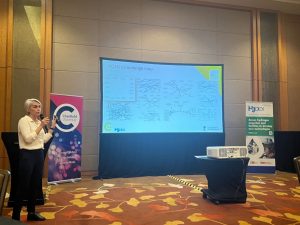
June 13, 2024, by aczht
Navigating the path to net-zero aviation
Navigating the path to net-zero aviation
Dr Nahid Yazdani recently attended the Singapore UK Jet Zero Workshops to showcase her East Midlands Airport Green Futures Study.
As an Assistant Professor in Strategy and International Business at Nottingham University Business School, Nahid brings diverse experience, holding a PhD in Business Strategy, an MBA, and a Material Science and Engineering degree. Her previous roles in the energy sector as an engineer, manager, and consultant enhance her current interdisciplinary work, which bridges social sciences and engineering to drive change in energy policy and practice in the UK.
Nahid is leading the social aspect of an interdisciplinary project that bridges social sciences and engineering to drive meaningful change in UK energy policy and practice. By integrating social science insights, stakeholder engagement, and policy development, her work aims to inform decision-making towards a sustainable economy.
Hear from Nahid about her work and presentations at the recent Singapore UK Jet Zero Workshops:
East Midlands Airport Green Futures initiative
The work is within the broader scope of the East Midlands Airport Green Futures initiative. Green Futures is a partnership of East Midlands Airport (EMA), EM Freeport, the University of Nottingham, Midlands Connect, Leicester and Leicestershire Enterprise Partnership, and Midlands Net Zero Hub, which brings together a vision of a future net zero ecosystem.
While technological advancements are undeniably crucial, their successful application and acceptance within the industry are equally vital. My role in this study involves conducting participatory knowledge-sharing among stakeholders, ensuring their active involvement in shaping and implementing sustainable solutions. I utilise a system approach to energy transitions and the Net-zero journey through stakeholders’ cognitive modelling. The transition to a green economy is complex and requires the full cooperation of governments, enterprises, scientific research institutions, and the public. There is often no one right answer, however the decision must be made with integrating all the abovementioned dimensions. Knowledge modelling tools help analyse such problems by combining the experience of many experts from different disciplines. It enables decision-makers to compare the perception of stakeholders and to simulate different policy options, allowing for discussion and insight into the advantages and shortcomings of possible decisions. In addition, the knock-on effects of different policy options can be modelled by such an approach.
Our primary objective is to integrate technological advancements with stakeholder engagement to drive sustainable solutions. Engaging stakeholders in meaningful dialogue and knowledge-sharing is key to driving positive change in the aviation sector.
This project is of immense significance as it addresses the pressing need for sustainable aviation practices. Our research aims to bridge the gap between innovation and practical application, making a tangible difference in the aviation industry by facilitating the adoption of greener practices and technologies. Our collaborative approach has gained support from industry leaders and experts, who recognise the importance of integrating stakeholder perspectives into decarbonisation efforts. We are planning to develop follow-on projects.
Insights from the Singapore UK Jet Zero Workshops
Dr Nahid Yazdani presenting at the Singapore UK Jet Zero Workshop 2024
This event, funded under a Science Innovation Fund Strategic Programme (under the joint UK-Singapore Green Economic Framework) and supported by the British High Commission in Singapore, brought together industry experts, policymakers, and researchers to explore sustainable solutions for decarbonising air travel.
The workshops focused on sustainable aviation fuel, hydrogen challenges, and policy ambitions. As one of the lead presenters, I had the opportunity to explain the complexities of airport decarbonisation, highlighting the importance of taking a systemic approach and engaging stakeholders to facilitate synergy and innovation.
Reflecting on the discussions held over the three-day event, it’s evident that achieving net-zero in aviation requires more than just technological advancements. It demands a comprehensive understanding of the complex interplay between policy, pricing, stakeholders, and energy supply. My presentations on days two and three centred on the ecosystem approach to decarbonising East Midlands Airport, underscoring its economic significance and the synergies needed to drive sustainable change.
Throughout the workshops, key policy figures and industry experts converged to share insights, exchange ideas, and forge collaborations. It was inspiring to witness the collective efforts aimed at addressing one of the most pressing challenges of our time. From lively debates to insightful discussions, the workshops provided a platform for meaningful dialogue and collaboration.
I’m grateful for the enriching experiences and valuable connections made during the Singapore UK Jet Zero Workshops. I’m excited to see how our collective efforts will shape the future of aviation and pave the way for a more sustainable tomorrow. Stay tuned for updates on the impact of our collaboration.
Decarbonise East Midlands Airport – East Midlands Airport Green Futures Study (EMAGFS)
Find out more about the East Midlands Airport Green Futures Study (EMAGFS)
No comments yet, fill out a comment to be the first


Leave a Reply